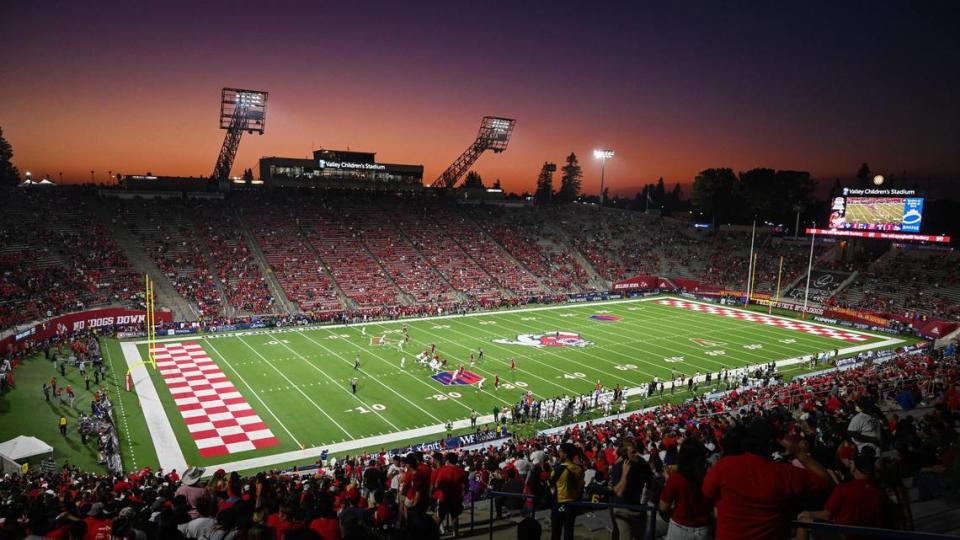Fresno State athletics could feel financial pinch in Year 2 of stadium naming rights deal
Fresno State could soon start to feel a financial pinch from its naming rights agreement at Valley Children’s Stadium, just as the university and athletics department barrel down a parallel track with a $250 million master plan to upgrade facilities that will start this summer.
A one-time $1 million payment the university gave to athletics to help activate the Valley Children’s partnership and support increasing sports operating costs will likely not be included in a 2023-24 budget that is under development, and it would not be a stretch that the Bulldogs’ sports programs could see a cut in their operating budgets.

“I would say that’s fair,” said Debbie Adishian-Astone, the university’s vice president for administration and chief financial officer, who also oversees the Athletic Corporation. “But we’re just starting to look at it, so it’s kind of early. We’re trying to look at everything and balance everything right now.”
University support to athletics hit $18.4 million this year with the $1 million one-time payment.
That support, including student fees, dropped by 22% from 2019-20 to 2020-21 and has not bounced back coming out of the COVID-19 pandemic, according to a budget presentation Adishian-Astone made to the university’s academic senate at its final meeting of the school year. It was $17.8 million in 2020-21, $17.5 million in 2021-22 and $17.4 million this year before the $1 million payment was added.
But that is only part of the problem for Fresno State sports programs, several of which already rank toward the bottom of the Mountain West Conference in operating expenses.
The contract between Fresno State and Valley Children’s is worth $10 million over 10 years, with annual $1 million payments to be made on Aug. 1 each year of the agreement.
The deal includes a high degree of exclusivity, shutting out other healthcare-related entities from sponsorship opportunities on campus, not just at the football stadium but also at the Save Mart Center, Pete Beiden Field at Bob Bennett Stadium, Margie Wright Diamond, the soccer stadium and any other existing or future stadium, field or area on campus that is owned or controlled by the university, and to home games or events of any tenant that plays in any of the sponsored athletics venues.
As a result, the university had to amend its multimedia rights contract with Learfield/Bulldog Sports Properties, cutting into the naming rights payment and athletics department revenues.
Under the original agreement with Learfield, athletics was to receive $3,395,000 this academic year, but in the revised contract that number shrank to $2,790,000, down by $605,000.
In 2023-24, it was to receive $3,545,000, but that is now down to $2,879,500, a loss of $665,500.
Naming rights does not impact facilities plan
The annual loss in revenue increases in the latter years of a deal that runs through 2025-26. The guaranteed rights fees in the final two years of the Learfield contract are locked in unless otherwise agreed to by the university and Bulldog Sports Properties; they are to meet by July 2024 regarding an extension of the deal.
In the final year of the contract with Learfield, the athletics department was to receive $3,845,000, but under the revised deal it will get only $2,879,500. There would be $35,000 remaining.
The revenue crunch does not impact the master facilities plan. The first phase, a renovation of the suites on the east side of the stadium, will be paid for through private donations and the $1.5 million buyout on the contract of former football coach Kalen DeBoer, who left for Washington two years into a five-year deal. Athletics operating revenue is generated through university support, ticket sales, donations, media rights and licensing agreements and distributions from the NCAA and the Mountain West Conference.
But the Bulldogs on the field and on the court could face some challenges stemming from the naming rights contract, with tighter operating budgets going forward.
Fresno State ranked ninth in the conference in basketball spending at $3.7 million in 2021-22, the most recent number available. That was about $1.1 million less than the average among public schools in the Mountain West.
The Bulldogs football program ranked fourth in the conference in operating expenses at $14.8 million when winning a Mountain West championship and becoming the first team in college football history to finish 10-4 after a 1-4 start.
That, however, is down significantly from 2018 when coach Jeff Tedford won his first conference title at his alma mater and expenses were $18.1 million.

